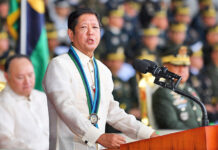BAMAKO, MALI (AP) – France’s announcement on Thursday that it will withdraw its troops from Mali was anticipated by many in this West African nation where Malians have protested the presence of soldiers from the former colonial power. But politicians and experts worry the French pull-out will result in a security vacuum that will embolden extremist groups to increase their power.
“Today it’s the terrorist groups who are happy with this announcement,” said former Cabinet minister Amadou Koita. He told The Associated Press he heard with regret French President Emmanuel Macron’s announcement on Thursday that France will withdraw its military from Mali within six months. France has troops in two military operations in Mali, Barkane and Takuba.
“We wanted our country to continue to benefit from the military support of France and Europe, and to make Mali a barrier against terrorism,” he said. “We hope that this announcement does not mean an abandonment of Mali by its partners and we hope that Mali will continue to benefit from cooperation with the entire international community.”
Mali’s security now lies in the hands of its own forces, Mali’s former prime minister Moussa Mara said. “I take note of this announcement of the departure of Barkhane and Takuba and it is now up to us Malians to organise ourselves and make efforts to take charge of our defence and our security,” he said.
Experts, however, noted that Mali’s security forces will be challenged to reorganise effectively in the six months’ timeline of the evacuation announced by Macron.
French troops will leave their bases in Gossi, in Mali’s central Gourma zone, in the north in Gao and in the east in Menaka. “It’s a short period to give the Malian army time to reorganise on the ground… This scenario can lead the country to a new reoccupation of areas as in 2012 by extremist groups,” said a researcher at the Institute for Security Studies Ibrahim Maiga.
“We know that the leader of the extremist group Iyad Ag Ghaly said that for him to negotiate peace with the Malian authorities, Barkhane must first leave,” he said.
“So the question now is will the extremist leaders stick to their word by negotiating directly with Bamako directly after Barkhane’s departure? Or will they try to reoccupy the ground (they held before) to have power before negotiating?”
Malian army spokesman Colonel Major Souleymane Dembélé said that despite the presence of French and European forces in Mali, it continues to be plagued by extremists who have encroached in many areas.
“What have they given us?” he asked during a press conference. “It is true that (the departure of European forces raises concerns, but Mali is not alone and will not remain alone. France and European countries can leave. I don’t want to anticipate. Let’s give it time and you will see what will happen.”
An August 2020 coup led by Colonel Assimi Goita grabbed power in Mali. Goita carried out a second coup by dismissing the civilian leaders in Mali’s transitional government and putting himself in charge last year. Many Malians have since staged large demonstrations against the French presence in the country.
An earlier coup in 2012 resulted in extremist rebels seizing control of Mali’s northern centres including Timbuktu, Gao and Kidal.
France sent troops in 2013 which pushed the extremists out of those cities, but the rebels have remained a strong presence in the vast rural areas.



















































